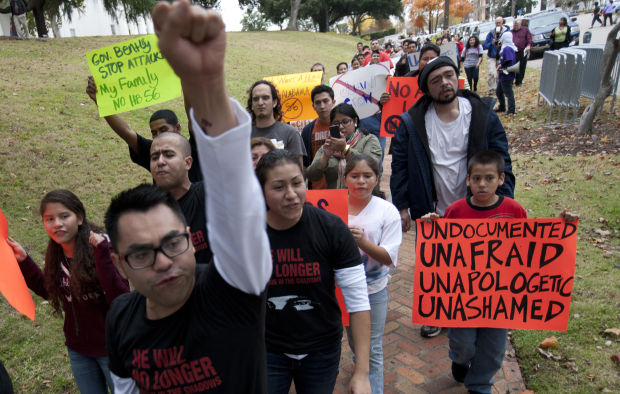After Arizona passed SB 1070 in 2010, it looked like many states would enact similar immigration laws.
“We thought everyone was going to follow Arizona. That was the expectation,” said Muzaffar Chishti, director of the Migration Policy Institute’s New York office.
In actuality, only a handful of states — Alabama, Utah, Indiana, Georgia and South Carolina — followed Arizona’s direct lead. They’ve all met a similar fate in the courts, starting with Arizona.
The Supreme Court struck down three of SB 1070’s provisions in June 2012 but allowed passage of the most controversial part, which requires police to try to check the immigration status of people they have detained if they develop reasonable suspicion that the person is in the U.S. without authorization.
After a lull in 2012 as the nation waited for the U.S. Supreme Court ruling on the constitutionality of SB 1070, states again started passing immigration laws last year — but much of the new legislation is friendlier to illegal immigrants.
California, the state with the largest unauthorized immigrant population, last year became the first state that shares a border with Mexico to issue driver’s licenses to people in this country illegally. Nine other states passed similar laws last year. And five states gave in-state tuition benefits to illegal immigrants, bringing the total number of states extending that benefit to 15.
Arizona has passed about a dozen immigration-related bills and resolutions since the governor signed the 2010 law, but they’re far less sweeping than earlier efforts to constrain benefits and enhance enforcement against people without legal status.
So far this session, lawmakers have introduced more than 50 bills and resolutions related to immigration. They range from supporting “reasonable and humane principles for comprehensive immigration reform” to making it a misdemeanor on first offense and a felony thereafter for any person in the country illegally to use a public resource, including driving on a public road.
“The aggressiveness of anti-immigration litigation, whether for political reasons or for pragmatic reasons, has diminished substantially,” said professor Gabriel Chin, an immigration law professor at the University of California at Davis.
Some provisions of SB 1070 were part of a wave of anti-illegal immigration proposals that began with 2004’s Proposition 200. That initiative required proof of citizenship to vote or to access public benefits not mandated by the federal government.
In the view of at least one legislator active in pushing those proposals, Arizona has now done all it can to reduce the effects of illegal immigration on the state.
“In Arizona, we’ve really covered the whole gamut,” said Rep. John Kavanagh, a Republican from Fountain Hills and prominent co-sponsor of SB 1070. “We did employer sanctions, we did 1070, we’ve taken away benefits. There’s not much left to do at the state level.”
Higher courts have seen to that. Last March, the 9th U.S. Circuit Court of Appeals ruled that a portion of SB 1070 prohibiting the solicitation of day laborers by drivers is unconstitutional because it violates the right to free speech. In October, the judges blocked a part of the law intended to punish people who transport people they know to be in this country illegally on the grounds that it was unintelligible.
Courts also blocked many of the provisions of Alabama’s immigration law, which went even further than SB 1070. It required schools to check the immigration status of K-12 students, and criminalized renting a home to someone without legal status. Major provisions of laws in Utah, Indiana, Georgia and South Carolina also were successfully challenged.
“Regardless of people’s policy views, legislators have to know that the Supreme Court has sent a pretty clear signal that there are severe limits on what states are allowed to do,” Chin said.
Seven suits were filed immediately after SB 1070 passed, each charging that it was fundamentally impossible to implement in a way that didn’t violate the U.S. Constitution.
And the legal challenges to SB 1070 are far from over.
The ACLU plans to launch a new round of legal action challenging how specific agencies have interpreted the law and filed a precursor document in the first of those — against South Tucson — in November.






